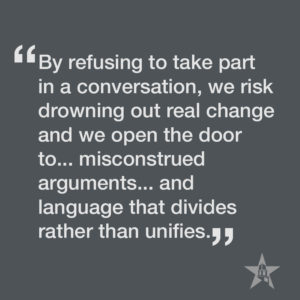Take Back the Night, Houghton’s annual weeklong examination of the effect of sexual assault across college campuses, is fast approaching. Discussing a controversial topic is hard. We all know this. Nothing worth talking about isn’t. Take Back the Night will attempt to encourage dialogue that seeks to explore the relationship between victim, perpetrator, and bystander. More broadly, the event examines the ways in which men, women, boys, and girls, by reasoning together, can address the issue in a more holistic way. The goal is to promote unity and to understand sexual assault as not merely a “women’s issue.” The language we use when discussing sexual assault is important, as it is with all matters pertaining to injustice. Such a dialogue should be engaging and accessible to an audience that may not fully understand the extent of the issue. It is of the utmost importance to avoid using language that risks alienating key members of that audience.
 No one would disagree that sexual assault is a huge problem. It is an atrocious, dehumanizing act that robs victims of their physical, mental, and spiritual well-being. However, like all matters of injustice, the mere suggestion of sexual assault can elicit a variety of powerful responses. Preconceived notions run wild, and speculation about the victim’s character begins to form.. Again, no one would deny that sexual assault is anything less than horrific, but our reactions are not always appropriate to the situation.
No one would disagree that sexual assault is a huge problem. It is an atrocious, dehumanizing act that robs victims of their physical, mental, and spiritual well-being. However, like all matters of injustice, the mere suggestion of sexual assault can elicit a variety of powerful responses. Preconceived notions run wild, and speculation about the victim’s character begins to form.. Again, no one would deny that sexual assault is anything less than horrific, but our reactions are not always appropriate to the situation.
As important as conversation around this issue is, many men are unwilling to participate in dialogue with proponents of social change because they feel that admitting the problem could make them complicit in the culture that surrounds assault. No one wants to feel targeted, but these feelings are often due to a misunderstanding of the argument. However, part of that misunderstanding stems from exclusive language that can delegitimize the experience of men. Such language is unhelpful, and removes a voice from a discussion that direly needs multiple perspectives.
The way we react to being told there’s a problem is important. By flying to Twitter or Facebook to rant, we very rarely achieve anything of real substance. Hearing a buzzword in an argument, lecture, or chapel and tuning out because of some perceived loss of the speaker’s credibility isn’t productive. It stifles progress and builds up barriers. By refusing to take part in a conversation we risk drowning out real change and we open the door to more of the same: misconstrued arguments, the alienation of key demographics, and language that divides rather than unifies.
 This has to be avoided at all costs. Where sexual assault is concerned, there are challenging systemic problems that have to be addressed. For example, why are the perpetrators of sexual assault overwhelmingly male? Where in the male developmental process does the behavior that fuels it begin to show? This is a conversation meant to be had by men and women, so that together, we can advocate for an end to sexual assault.
This has to be avoided at all costs. Where sexual assault is concerned, there are challenging systemic problems that have to be addressed. For example, why are the perpetrators of sexual assault overwhelmingly male? Where in the male developmental process does the behavior that fuels it begin to show? This is a conversation meant to be had by men and women, so that together, we can advocate for an end to sexual assault.
Seminars, surveys, and informational videos certainly communicate a clear message against harassment and improper behavior, but their effectiveness is hampered greatly by their oftentimes dry execution. We need more than that if we expect to see a change in the way society deals with sexually based offenses. Critics of the seminar/survey method call such measures like sensitivity training a mechanical response unlikely to amount to substantial progress. What many psychologists and activists recommend instead, is leadership training and tying the issue back to the initial point of the value of communication.
By holding ourselves to higher standards, by governing closely the words that leave our mouths, and by holding others to those standards accordingly is how a culture begins to change. Martin Luther King Jr. cautioned, “In the end, we will remember not the words of our enemies, but the silence of our friends.” He urged his listeners to not sit idly by while their brothers and sisters marched in the streets, but to make their voices heard. Individuals against sexual assault share the same vision.
Jackson is a senior political science major with minors in Spanish and business administration.

